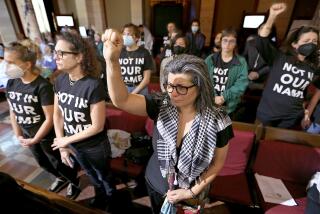Local Muslims Praise Aid to Brethren
- Share via
Before praying, Hassan Rizk stood outside a Reseda mosque passing out sugary dates and tiny cups of zamzam, or holy water. Dressed in a white desert robe with a turban on his head, he clasped hands with worshipers and blessed them. This is his routine every Friday, Islam’s holy day.
A Palestinian immigrant, Rizk is usually critical of American foreign policy. But not when it comes to the conflict in Kosovo.
“I support what America is doing,” he said. “I appreciate how the government is helping the Muslim people.”
There’s no doubt that the Kosovo conflict is galvanizing the Muslim community in Southern California as it rallies to provide aid to Muslim refugees. But NATO’s intervention on behalf of the predominantly Muslim ethnic Albanians is significant for many of the area’s 750,000 Muslims in another way: It is helping shift a long-held belief that their government is hostile to their religion.
Many of Washington’s recent foes--Afghan terrorists, Middle East dictators--are Muslim. But in Kosovo, America is fighting for people who worship Allah.
“This can’t hurt,” said Ibrahim Hooper, a spokesman for the Council on American-Islamic Relations, a Washington-based advocacy group with a branch office in Los Angeles. “Muslims very often feel they are the victims of U.S. foreign policy. Kosovo is a first because the American intention is to help the Muslims.”
And just as Muslims may be revising their views of the U.S. government, the focus on Kosovo may help dispel stereotypes of Muslims as terrorists.
“The Kosovo crisis should resonate among European Americans who now see that Muslims are people who look like them, with blond hair and blue eyes,” said Salam Al-Marayati, director of the Los Angeles-based Muslim Public Affairs Council. “It should help Americans not to confuse faith with ethnicity.”
Al-Marayati’s job is to reach out to the media and community organizations and educate them about Islam. But his outspokenness is unusual among Muslims in Los Angeles. Islam is a religion of modesty, from the veils women wear to the rules about giving charity anonymously, and Muslim groups traditionally keep a low profile.
But the crisis in Kosovo is changing that, spurring the more than 60 Muslim religious centers in Southern California to assert themselves in their communities. Last week, the Islamic Center of Southern California held an interfaith vigil downtown to show support for ethnic Albanian refugees and the North Atlantic Treaty Organization’s actions. Other centers in places with large Muslim concentrations, such as Anaheim and Granada Hills, have organized rallies and discussions. A huge fund-raiser is planned in Buena Park for April 18.
Through all this, Islamic leaders say their community has become less isolated.
“We have been flooded by calls from people outside of Islam,” said Mudhasar Al-Tawash, head of the American branch of Islamic Relief, in Burbank. “Many people who I know aren’t Muslim have volunteered to take Muslim refugees into their homes, if it’s needed.”
The Burbank office is the hub of Islamic charity efforts in America. Here, men with traditional beards and women in head scarves scramble to answer phones, take pledges and wire money to an office in Albania.
There hasn’t been such a flurry of activity in the local Muslim community since the mid-1990s, during the civil war in Bosnia-Herzegovina. Then, many here were outraged that, despite widespread reports of atrocities against Bosnia’s Muslims, the United States was slow to help. About 200,000 people, mostly Muslim civilians, were killed before NATO bombing raids in 1995 helped spur a negotiated end to that war.
“A lot of Muslims were asking, if the women who were being raped had been Jewish or Christian, would the American government have gone into Bosnia,” said Yvonne Haddad, a history professor at Georgetown University’s Center for Muslim-Christian Understanding. “Many Muslims feel that Americans view them as sinister and not worthy of aid.”
Some of that cynicism carries over to the Kosovo issue. Some Muslims question NATO’s motives, saying the alliance is intervening only to keep ethnic Albanian Muslims from spilling into other European countries.
Others, while pleased to see the United States fighting for their brethren, are still frustrated. The U.S. government, they say, seems reluctant to acknowledge that the people it is helping are Muslim.
“You never hear officials refer to the refugees as ‘Muslim Albanians.’ They always say ‘ethnic Albanians,’ ” said Mohammed Diwan, the public relations director of the Los Angeles branch of the Council on American-Islamic Relations. “As long as they say ‘ethnic Albanians,’ the American people want to help. If they said ‘Albanian Muslims,’ nobody would want to help.”
More to Read
Sign up for Essential California
The most important California stories and recommendations in your inbox every morning.
You may occasionally receive promotional content from the Los Angeles Times.













